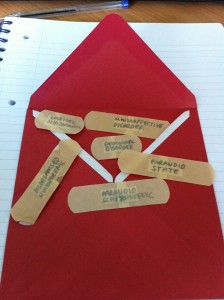By Jenna Condie
Last week, we welcomed applicants who currently hold an offer to study one of our psychology undergraduate courses (starting September 2013) to a Psychology Taster Event. The idea of the day was to help applicants make their decisions about which university to go to and which course to embark on. Hopefully our Taster Event gave applicants a better insight into the areas of psychology that they would cover at degree level and our interactive approach to teaching psychology here at Salford.
Attendees were welcomed in our main lecture theatre by Anne Pearson, our Admissions Tutor for all Salford Psychology undergraduate courses. Next up was a taster lecture with Dr Ashley Weinberg who introduced attendees to the area of emotional intelligence, an area of psychology we specialise in at Salford. Tweets from the University’s press office relating to Ashley’s talk are below.
[View the story “Psychology Taster Event 2013” on Storify]After the taster lecture, attendees were invited to a number of demonstrations in the Psychology department. Ruth Laidler, a psychology tutor and PhD researcher, introduced attendees to Developmental Psychology and child development with a video demonstration. She introduced attendees to Jean Piaget’s work and a Piagetian style task called Conservation. Students were informed that they would study developmental psychology in their first and second years as it is a core area specified by the BPS accreditation. Also, should they want to do so, students can take an option module in Educational Psychology in the final year of their study.
Lecturers Dr Lynne Marrow and Janine Crosbie had a number of Biological Psychology demonstrations for attendees to try out. Our guests participated in a number of activities from measuring their Galvanic Skin Response to examining visual illusions. The handout Lynne and Janine created for the event is below.
In our psychology computer suite Dr Adam Galpin introduced students to Cognitive Psychology. Adam first demonstrated how little of the world people pay attention to by showing how we can miss things changing in front of our eyes (“change blindness”). He then described one of the projects our students get stuck into to test their own hypotheses about change blindness. The applicants also came up with great ideas for further experiments, so we’ll look forward to testing them when they arrive!
There was a mental health talk with Dr Linda Dubrow-Marshall and a final year student Ashley Carrick, which provided the opportunity for interesting and important debates around mental health and well-being. Attendees also participated in a true or false quiz on mental health. Here’s one of the questions:
Among teenagers, the rates of depression have increased by how much over the past 25 years?
- 18%
- 35%
- 70%
What do you think? (the correct answer is at the end of this post).
Dr Ashley Weinberg returned to demonstrate the kinds of social psychological experiments that are possible in our observation suite which has a two-way mirror. In CSI style, our guests observed two people and tried to work out whether they were telling the truth by interpreting their non-verbal communication. This demonstration highlighted some of the challenges of understanding people and social behaviour.
The day closed with refreshments and the opportunity for attendees to get to know one another and ask staff and current students any questions. We would like to thank our students – Sophie Coulson, Hannah Smith, Ashley Carrick, Rhona Robinson and Nicol Herta – for welcoming prospective students to Psychology at Salford. We would also like to thank attendees who completed our feedback form too. It is great to know that they enjoyed the day and the welcoming atmosphere. We now know that attendees would have liked a little more time in each of the demonstrations. We will definitely make sure that happens in future Taster Events.
On that note, we will be organising more Psychology Taster Events in the future. In the meantime, we also have an Open Lecture Series starting this week on the 5th March 2013. The open lectures are all first year psychology lectures where you can attend with current Salford psychology students and experience university study and campus life.
If you have any questions, would like to attend one of our events, or would like information about our courses, please contact Anne Pearson (Admissions Tutor) on a.pearson1@salford.ac.uk





